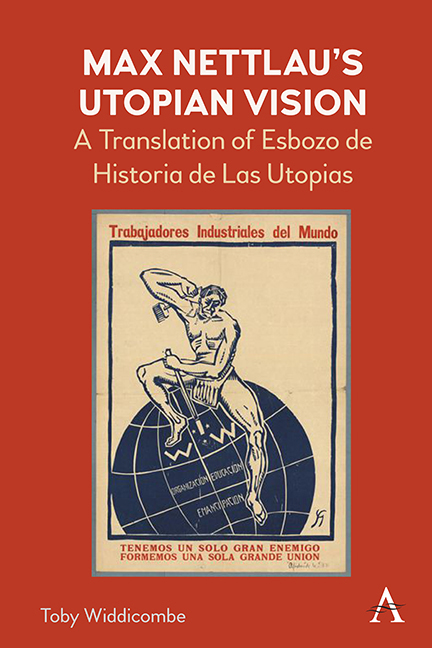Book contents
- Frontmatter
- Dedication
- Contents
- Preface
- Acknowledgments
- Introduction
- Outline of the History of Utopias
- 1 Definition
- 2 The Classical and Medieval Ages
- 3 The Renaissance and Neo-Classical Periods
- 4 The Nineteenth Century (to 1888)
- 5 1888 to the Twentieth Century
- 6 The Twentieth Century: 1900–1925
- Notes
- Appendix A Select Nettlau Bibliography
- Appendix B An Annotated Gazetteer of Nettlau’s Utopians
- Appendix C List of Intentional Communities in Esbozo
- Appendix D List of Utopian Newspapers and Journals in Esbozo
- Bibliography
- Index
1 - Definition
Published online by Cambridge University Press: 18 November 2023
- Frontmatter
- Dedication
- Contents
- Preface
- Acknowledgments
- Introduction
- Outline of the History of Utopias
- 1 Definition
- 2 The Classical and Medieval Ages
- 3 The Renaissance and Neo-Classical Periods
- 4 The Nineteenth Century (to 1888)
- 5 1888 to the Twentieth Century
- 6 The Twentieth Century: 1900–1925
- Notes
- Appendix A Select Nettlau Bibliography
- Appendix B An Annotated Gazetteer of Nettlau’s Utopians
- Appendix C List of Intentional Communities in Esbozo
- Appendix D List of Utopian Newspapers and Journals in Esbozo
- Bibliography
- Index
Summary
Utopia. How easily one scorns the genre. It is considered useless, illusory, contrary both to reality and to science. Let us guard against following such dry, utilitarian voices! The world is poor enough as it is right now, and utopia is altogether one of its rarest flowers. Truly poor is the man who doesn't cherish utopia, who can't sustain in his mind an eternal utopia built according to some ideal, as much universal as individual, that he conceives of in his earliest youth. Such a utopia will be very flexible in construction. It will be something he adds to or alters at each step of his intellectual and moral development, something that grows, gets old, and dies with him. What an empty mind it is that doesn't know utopia, that thinks—from pride, resignation, or triviality pure and simple—there is nothing more than the present moment! Not that one has to make an abstraction of the present; on the contrary, carpe diem matters. However, those who are absolutely absorbed in what is are as incomplete as those who live in nothing more than a dream, in nothing more than a utopia.
Utopia is a social phenomenon that occurs in every epoch, and is one of the primary and oldest forms in which progress and rebellion are expressed. The desire to lift oneself above a present that seems acceptable only to the power broker or the pleasure seeker; the hope that one day one will triumph when the chance occurs and one becomes transformed into reflecting on the future, into envisioning what one can become. This process alternates in the healthy organism with the impulse to focus on the here and now, on whatever action, work, investigation, or experiment lies to hand. Indeed, because of this impulse, because men would have been truly free and happy by attending to their own affairs, the worst authoritarian clergymen have always tried to prevent them from becoming complete men. In some men, they have cultivated only a liking for the present, for vulgar pastimes, while in others, the dispossessed and the conquered, they have cultivated a belief that the only hope lies in a future under some form of heavenly justice—either the happiness of paradise or the punishment of hell that is found in all religions.
- Type
- Chapter
- Information
- Max Nettlau's Utopian VisionA Translation of Esbozo de Historia de Las Utopias, pp. 3 - 8Publisher: Anthem PressPrint publication year: 2023

